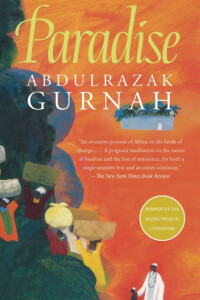
In one of my writing classes, we were discussing Isak Dineson’s memoir Out of Africa with its haunting opening: “I had a farm in Africa, at the foot of the Ngong Hills.” She goes on to describe the beauty of the landscape: “There was no fat on it and no luxuriance anywhere; it was Africa distilled up through six thousand feet.” She gives us the burnt colors like pottery, the spice-scented grass, and “the crooked bare old thorn-trees,” ending with “Everything that you saw made for greatness and freedom, and unequalled nobility.”
Since we were talking about setting and how to describe it through the perceptions of your main character, we speculated as to how someone from one of the tribes displaced by the colonial powers would describe the same setting.
In this second novel from Gurnah, who was born in Zanzibar—now part of Tanzania—and won the Nobel Prize, we find that important perspective so missing in Western literature. Yusuf, a rural Muslim boy who leaves his home at twelve, remembers:
. . . it was the season of drought, when every day was the same as the last. Unexpected flowers bloomed and died. Strange insects scuttled from under rocks and writhed to their deaths in the burning light. The sun made distant trees tremble in the air and made the houses shudder and heave for breath. Clouds of dust puffed up at every tramping footfall and a hard-edged stillness lay over the daylight hours.
Told he’s going on a visit with the man he’s been taught to call Uncle Asiz, a wealthy trader, Yusuf later learns he has been given in payment for his father’s debts and that Asiz is his seyyid or master, not his uncle. The boy is put to work in the store under Kahlil, an older Indian, also collateral for his father’s debt, who introduces him to the complex society of precolonial urban East Africa.
Yusuf’s story unfolds gradually. He begins volunteering to help the elderly gardener in Asiz’s gorgeous walled garden. When he’s 17, Asiz takes him on a trading trip to the interior, leaving him for years with one of his trading partners in a small village, before returning to take him even deeper in the hills. It becomes an epic journey into the heart of a country on the verge of change. They encounter disease, raging rivers, and hostile tribes, as well as a gorgeous waterfall that is said to be the gates of Paradise. Later Yusuf is brought back to town and the garden he loves, yet which becomes his undoing.
The seyyid could travel deep into strange lands in a cloud of perfume, armed only with a bag of trinkets and a sure knowledge of his superiority. The white man in the forest feared nothing as he sat under his flag, ringed by armed soldiers. But Yusuf had neither a flag or righteous knowledge with which to claim superior honour, and he thought he understood that the small world he knew was the only one available to him.
Although Yusuf is a slave, this is not structured like a traditional slave narrative which is about escaping to freedom. Instead, it is a coming-of-age story in which Yusuf seems to make the best of each new adventure. Terrified at times, he doesn’t rebel against being a slave. He doesn’t complain about his exile from each of the homes he’s found or try to escape, even as the dangers grow and the risks more terrifying. Then, as the walled garden turns into a place of danger, the rumored encroachment of the German colonizers becomes a reality.
It appears to be a retelling of the story of Joseph in the Koran, at least in part. Published in 1994 and shortlisted for the Booker prize, Paradise is set just before the World War I and provides an unforgettable portrait of precolonial East African society.
What book have you read set in East Africa?
I did! I read Gurnah’s Gravel Heart after he won the Novel Prize in Literature. A correction: I believe Gurnah was born in Zanzibar, not Tanzania.
There are all sorts of truths here about immigrants and the long effects of colonialism: the resentments, the racism, the inability to feel at home either in the new world (England) or the old (Zanzibar), the ruination of lives. I felt that I came to understand the main character, Salim, with some real complexity. Full review here: https://www.goodreads.com/review/show/4840320455
Lovely review from a writer’s perspective, Barbara!
Thanks, Susan. I’ve updated the post to clarify. I’ll definitely check out Gravel Heart and your review.